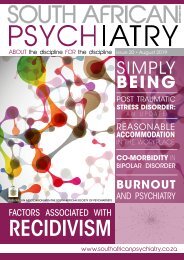South African Psychiatry - February 2019
South African Psychiatry - February 2019
South African Psychiatry - February 2019
You also want an ePaper? Increase the reach of your titles
YUMPU automatically turns print PDFs into web optimized ePapers that Google loves.
FEATURE<br />
in <strong>South</strong> Africa existed as a result of Apartheid, but<br />
these have yet to be redressed. The country still faces<br />
many social, political and economic challenges and<br />
is one of the most economically unequal countries<br />
in the world, with a Gini co-efficient of 0.7.<br />
THE TOP 10% OF THE POPULATION<br />
CONTRIBUTE (AND BENEFIT FROM)<br />
58% OF THE INCOME AND THE BOTTOM<br />
10% ONLY 0.5%. THIS IS RELEVANT AS<br />
ECONOMIC AND SOCIAL FACTORS<br />
CONTRIBUTE TO HEALTH EQUITY AND THE<br />
GENERAL HEALTH OF A SOCIETY. THIS<br />
IS SIGNIFICANT AS SOCIAL INJUSTICE<br />
IMPACTS NEGATIVELY ON HEALTH AND<br />
HEALTH EQUALITY. 15 THE HIGH RATES OF<br />
PERINATAL DEPRESSION MAY BE RELATED<br />
TO THE COMPOUNDING NATURE OF<br />
MULTIPLE ECONOMIC, SOCIAL AND<br />
PSYCHOSOCIAL STRESSORS.<br />
These including poverty and unemployment,<br />
intimate partner violence, lack of partner support,<br />
unplanned pregnancy, and the high prevalence<br />
of HIV in pregnant women (39-45%), including<br />
diagnosis of HIV infection in the course of antenatal<br />
care. 12,13,16-19 Similar associations have been found in<br />
other low and middle income countries.<br />
A SYSTEMATIC REVIEW CONDUCTED IN<br />
2012, INCLUDING VARIOUS COUNTRIES<br />
FROM BOTH ASIA AND AFRICA,<br />
FOUND THAT SOCIOECONOMIC<br />
DISADVANTAGE COMPRISING OF FOOD<br />
INSECURITY, FINANCIAL DIFFICULTIES,<br />
UNEMPLOYED PARTNER AND LOW<br />
INCOME WERE ASSOCIATED WITH<br />
PERINATAL DEPRESSION.<br />
In addition, social disadvantage comprising of<br />
poor emotional support and lack of empathy<br />
from partners, having hostile in-laws and having<br />
insufficient practical and emotional support,<br />
contributed to the risk of perinatal depression. 1<br />
From this, it is clear that maternal depression has<br />
multiple etiologies, and cannot be solely explained<br />
by women’s biological and psychological<br />
vulnerability. Rather, social and environmental<br />
factors are important contributing factors and<br />
determinants of risk and sociocultural context<br />
impacts both prevalence and presentation of<br />
perinatal depression. 20,21<br />
Recently there has been an increased awareness<br />
that mental health is a vital part of public health in<br />
<strong>South</strong> Africa. About 16.5% of <strong>South</strong> <strong>African</strong>s suffer<br />
from common mental disorders. 22 In responding<br />
to this, most provincial health services support<br />
the integration of mental health in primary health<br />
care, run by primary health care nurses who have<br />
undergraduate training in mental health. These<br />
nurses are able to continue prescriptions while<br />
primary health care doctors initiate prescriptions<br />
with drugs available on the essential medicines list.<br />
Mental illness cannot be viewed in isolation,<br />
however, as many social, political and economic<br />
factors, including those elucidated above, play a<br />
role in epidemiology of the illness. In <strong>South</strong> Africa,<br />
the country’s high rate of mental health disorders,<br />
including perinatal depression, is exacerbated<br />
by high levels of violence, social and economic<br />
exclusion and racial discrimination, as existed<br />
under colonialism and apartheid, and as a result of<br />
apartheid’s continued legacy.<br />
ONE OF THE KEY OBJECTIVES OF SOUTH<br />
AFRICA’S MENTAL HEALTH CARE ACT<br />
2002 (NO. 17 OF 2002) IS TO INTEGRATE<br />
THE PROVISION OF MENTAL HEALTH<br />
CARE SERVICES INTO THE GENERAL<br />
HEALTH SERVICES ENVIRONMENT. 23<br />
THIS IS FURTHER SUPPORTED BY THE<br />
SUBSEQUENT NATIONAL MENTAL HEALTH<br />
POLICY FRAMEWORK AND STRATEGIC<br />
PLAN 2013-2020, 24 IN WHICH MATERNAL<br />
MENTAL HEALTH IS INCORPORATED<br />
INTO THE GENERAL MENTAL HEALTH<br />
ENVIRONMENT, INCLUDING THROUGH<br />
THE TREATMENT OF PERINATAL<br />
DEPRESSION AND ANXIETY AT ANTENATAL<br />
AND POSTNATAL CLINICS.<br />
The policy states:<br />
• Specified micro and community level mental<br />
health promotion and prevention intervention<br />
packages will be included in the core services<br />
provided, across a range of sectors, to address<br />
the particular psychosocial challenges and<br />
vulnerabilities associated with different lifespan<br />
developmental stages. These will include:<br />
Motherhood: treatment programmes for maternal<br />
mental health as part of the routine antenatal<br />
and postnatal care package; and programmes<br />
to reduce alcohol and substance use during and<br />
after pregnancy. Infancy and Early childhood:<br />
programmes to increase maternal sensitivity and<br />
infant-mother attachment.<br />
• Introduce routine indicated assessment and<br />
management of common mental disorders in<br />
priority programmes at PHC level, among others,<br />
antenatal mothers and postnatal care.<br />
In addition, the <strong>South</strong> <strong>African</strong> National Development<br />
Plan 2030 (2012) 25 makes specific reference to<br />
early childhood development by emphasizing the<br />
importance of the first 1000 days of life, describing<br />
how pregnant women need access to both<br />
emotional and material support, and explaining<br />
SOUTH AFRICAN PSYCHIATRY ISSUE 18 <strong>2019</strong> * 35
















